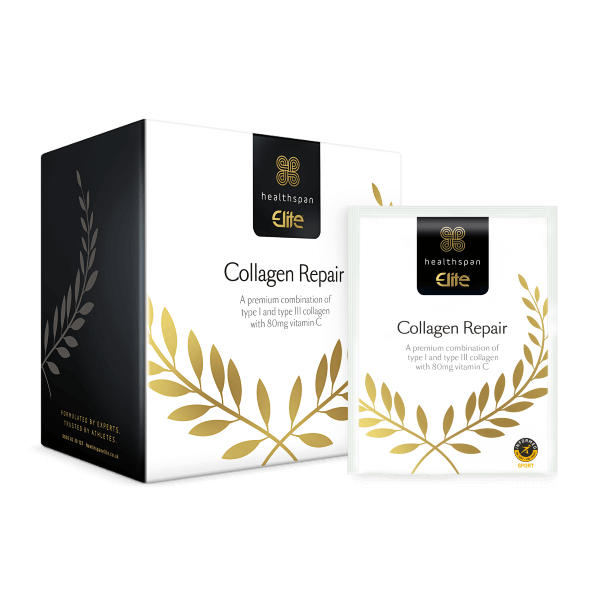Repair and recovery is vital for athletes, to minimise time lost to injury. Here's how collagen supplements can help, explains sports nutritionist Rob Hobson.
🕒 4 min read
What do collagen supplements do?
Collagen is made up of amino acids glycine, proline and hydroxyproline, and is the most abundant protein in the body. Collagen provides structure and support to many tissues, including bones, tendons, ligaments, and skin, and is essential for maintaining healthy connective tissue.
The intense demands of training can put the body under significant stress and increase the risk of injury. Supplementing with collagen may help to strengthen and repair tissues and, in turn, enhance overall performance and recovery.
What are the different types of collagen?
There are several types of collagen in the body, with types I and III shown to work together to support the repair of tendons and ligaments.
Type I collagen
This is the most abundant type in tendons and ligaments, providing strength, structure, and tensile resistance, all of which are essential for their integrity and function.
During recovery from injury, type I collagen is synthesised and delivered to the damaged areas, which helps to rebuild and strengthen the injured tendon or ligament. The collagen fibres enhance the tissue's ability to withstand forces and help it regain its functionality.
Type III Collagen
This type of collagen can also be found in tendons and ligaments. It plays a critical role in the earlier stages of tissue healing, which include the initial inflammatory and proliferative (cell production) phases of the repair process.
Type III collagen helps provide a framework for forming new red blood vessels and the organisation of other collagens, such as type I. Type III collagen is eventually replaced with stronger type I collagen as healing progresses.

Both type I and type III collagen are involved in tendon and ligament repair, at different stages in the process.
How do collagen supplements promote joint health and prevent injury?
The intensity of training and the repeated motions performed by athletes can eventually lead to joint issues causing discomfort, as well as inflammation and an increased risk of injury.
Collagen supplements have been found to support joint health by improving the integrity of cartilage and reducing joint pain and stiffness. Several studies have shown that collagen supplementation can increase joint flexibility and reduce the risk of injury. This allows athletes to train with increased intensity for longer, with less risk of common injuries.
Supplements containing types I and III collagen alongside vitamin C (required for synthesising collagen in the body) are commonly used to help accelerate recovery from injury. Research has shown how their use has successfully supported the rehabilitation and return to play from anterior cruciate ligament (ACL) reconstruction as well as helping to reduce knee pain.

Collagen Repair
Type I and type III collagen in an orange-flavoured drink
- 20g type I and type III hydrolysed collagen per serving
- 80mg added vitamin C to support cartilage formation
- Collagen plays a vital role in tendons and ligaments
How do collagen supplements accelerate recovery and enhance performance?
A crucial component of athletic performance is muscle recovery after exercise. Collagen plays a vital role in encouraging muscle tissue regeneration, leading to faster recovery times and reduced muscle soreness. Collagen contains amino acids that support the synthesis of new muscle proteins, aiding in muscle repair and growth.
A study published in the journal Amino Acids investigated the effect of resistance exercise on muscle hypertrophy (growth) with or without a collagen supplement. The study showed more significant muscle hypertrophy and muscle growth-related changes in gene expression in the collagen group than in the group given a placebo.
How do collagen supplements help to build stronger bones?
Bone strength will significantly impact an athlete's success and risk of injury. Collagen provides a structural framework for bones and enhances strength and density.
Collagen supplementation has been shown to stimulate the synthesis of bone cells, increase bone mineral density, and reduce the risk of fractures. High-impact sports can significantly strain athletes' skeletal systems, and collagen can be a valuable tool to help maintain good bone health and prevent injuries, alongside a proper diet and training routine.
A study of post-menopausal women at greater risk of osteoporosis found that after receiving collagen peptides, they experienced a significant increase in bone density compared to those who received a placebo.
What should you look for in a supplement?
Competing athletes should always make sure their supplements are Informed Sport Approved and so batch-tested for banned substances. Hydrolysed forms of collagen are preferable, as this means they are broken down into smaller peptides, allowing for easier absorption and utilisation. Added vitamin C is also helpful, as this nutrient is used to make collagen in the body.
Collagen offers multiple benefits to athletes, supporting bone, tendons, and ligament health. Given the high prevalence of joint and tendon injury in athletes, collagen supplements may be a valuable part of a comprehensive training, nutrition, and recovery approach.









